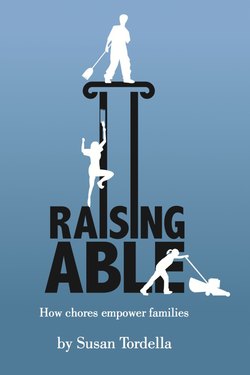Читать книгу Raising Able - Susan Tordella - Страница 28
На сайте Литреса книга снята с продажи.
Chores correlate to lower alcohol use
ОглавлениеIn a survey on childhood chores I developed for this book, the 564 respondents agreed: childhood chores taught them responsibility and a work ethic. The people who took the survey were between 11 and 92 years old, with a median age of 35.
One correlation showed children with regular chores around the house from ages 2-12 had a lower incidence of alcohol use in high school. Some 62 percent of the people who did chores regularly abstained from regular alcohol use in high school. There’s more good news. People who had childhood chores were 24 percent more likely to report they were good college students.
Integrating chores into a democratic family atmosphere with mutual respect lays the foundation for decent teenagers who will use good judgment. Doing simple chores from an early age builds self-discipline, counteracts entitlement and develops teenagers who can handle freedom with responsibility.
Entitled children and teens are often protected from experiencing the relationship between their decisions and a negative outcome because parents constantly bail them out, make excuses and tell them everyone else is wrong, not them.
Cleaning a toilet, sweeping a floor and weeding a flowerbed are sure cures for entitlement. It changes how one views work, self and the world.
Respondents agreed: chores prepared them for life.
“I was glad to know how to take care of myself, and do it with a high degree of precision,” said a 51-year-old woman of her regular chores that started when she was 6 years old and continued until she left home.
I expected to find that chores had gone out of style, but 87 percent reported they had regular childhood chores. Of the 13 percent across all ages who reported no chores, nearly half were less than 30 years old. We found nothing else in common with the no-chores group.
Young people who had chores between ages 13 and 21 were three to four times more likely to report high educational achievement.
In my confidential survey, tweens and teens who responded made the following confessions about chores:
“I help out, and it’s expected I do so, but I’m hardly held to it.”
“Honestly sometimes these (chore) assignments are not fulfilled.”
“It somewhat teaches me to be self sufficient.”
“I don’t mind working around the house. But I would rather not.”
“I know I need to do it and it’s good for me, but still…”
I heard a longing in the young people’s comments to be held responsible to do the chores, even if they don’t feel like it. Deep down, they know helping out is good for them, even though their first impulse is to avoid it. It’s part of the Yin-Yang of adolescence.
Parenting is a long-term commitment, as you know. Very long.
Like teens, parents sometimes have mixed emotions. Parents don’t always have the energy, time and patience we’d like to have. If we show up most of the time and do the right thing most of the time with a good intention, it’s good enough. We don’t have to be perfect.
A chore system will eventually payoff. A 49-year-old woman from the Boston area who responded to my survey credits chores with developing life skills. “I truly learned a lot as I did chores that I now use to make my life easier today. How to remove stains in our laundry, how to cook for large groups on a budget from scratch, how to have fun while pitching in, and the old adage, ‘many hands make light work.’
“I look back and realize how much I learned as I was growing up, what I thought as hard were things that other friends never learned, how to iron a shirt, fold linens, set a proper table, all sorts of things I never thought I would use in life.”
